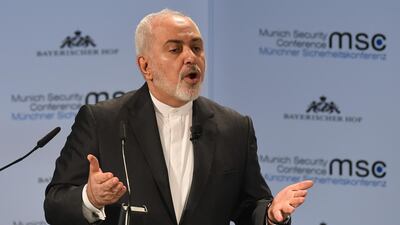Iranian Foreign Minister Mohammad Javad Zarif urged diplomats and staff not to walk out in response to his decision to stand down.
“It has been an honour to work beside you. I hope my resignation will lead to a return of the ministry of foreign affairs to its legal place in foreign relations. I thank you all,” Mr Zarif said in reaction to news that ministry employees may leave after his resignation
The news that Mr Zarif would tender his resignation – made in an Instagram post late on Monday – was met with consternation by many in Tehran.
About 150 MPs signed a letter to President Hassan Rouhani urging him to persuade Mr Zarif to stay on, the Islamic Republic News Agency reported.
Ali Najafi Khoshroodi, spokesman for parliament’s National Security and Foreign Policy Commission, told Irna he had signed the letter and was collecting more signatures.
Mostafa Kavakebian, a reformist MP, was among those calling for Mr Rouhani to reject the resignation.
“Undoubtedly the Iranian people, government and state will not benefit from this resignation,” he said.
“A great majority of MPs demand that the president never accept this resignation,” he tweeted.
The president has yet to accept Mr Zarif’s departure.
The Tehran Stock Exchange dropped 1 per cent as markets opened.
Mr Zarif, 59, offered an apology for his “shortcomings” in the unexpected message on Monday night.
He has served as Mr Rouhani’s foreign minister since August 2013 but faced constant pressure and criticism from hardliners who opposed his policy of detente with the West.
“I apologise for my inability to continue serving and for all the shortcomings during my term in office,” Mr Zarif said.
The outgoing foreign minister received lavish praise in Iran after he used his speech on February 17 at the Munich Security Conference to defend the country’s policies and its missile programme.
Social media users who said they often criticised the minister praised his remarks and clips of the speech were widely shared in Iran.
The resignation came shortly after a surprise visit to the country by Syrian President Bashar Al Assad. State media reports and images showed that he met Mr Rouhani and the country's leader Ayatollah Ali Khamenei. The shadowy Iranian Revolutionary Guard Gen Qasem Soleimani also attended the meetings. Mr Zarif was not included in the reports.
US Secretary of State Mike Pompeo tweeted that “we note JZarif’s resignation. We’ll see if it sticks”.
“Either way, he and Hassan Rouhani are just front men for a corrupt religious mafia,” Mr Pompeo said.
“We know Khamenei makes all final decisions. Our policy is unchanged – the regime must behave like a normal country and respect its people.”
As one of the architects of the 2015 Iran nuclear deal, Mr Zarif’s standing with his country’s hardliners took a hit when the White House announced it was withdrawing last year.
Since then, Washington has reimposed sanctions and taken a strong stance against Iran and its proxy forces.
Ultra-conservatives said Mr Zarif had negotiated a bad deal that failed to gain anything meaningful for Iran.
The face-off between the minister and his critics only intensified as time passed, with Mr Zarif saying his main worry throughout the nuclear talks had been about pressure from inside Iran.
Mr Zarif’s departure will be regarded as worrying in Europe. which has tried to keep the 2015 deal alive even without the involvement of the US.
Even Mr Rouhani, who was propelled to office on the promise of economic and social liberalisation, is facing stronger calls to resign as the currency value continues to tumble and US-led sanctions bite hard.
The country has faced protests from traders and workers who are struggling as their livelihoods suffer due to the latest American pressure.

